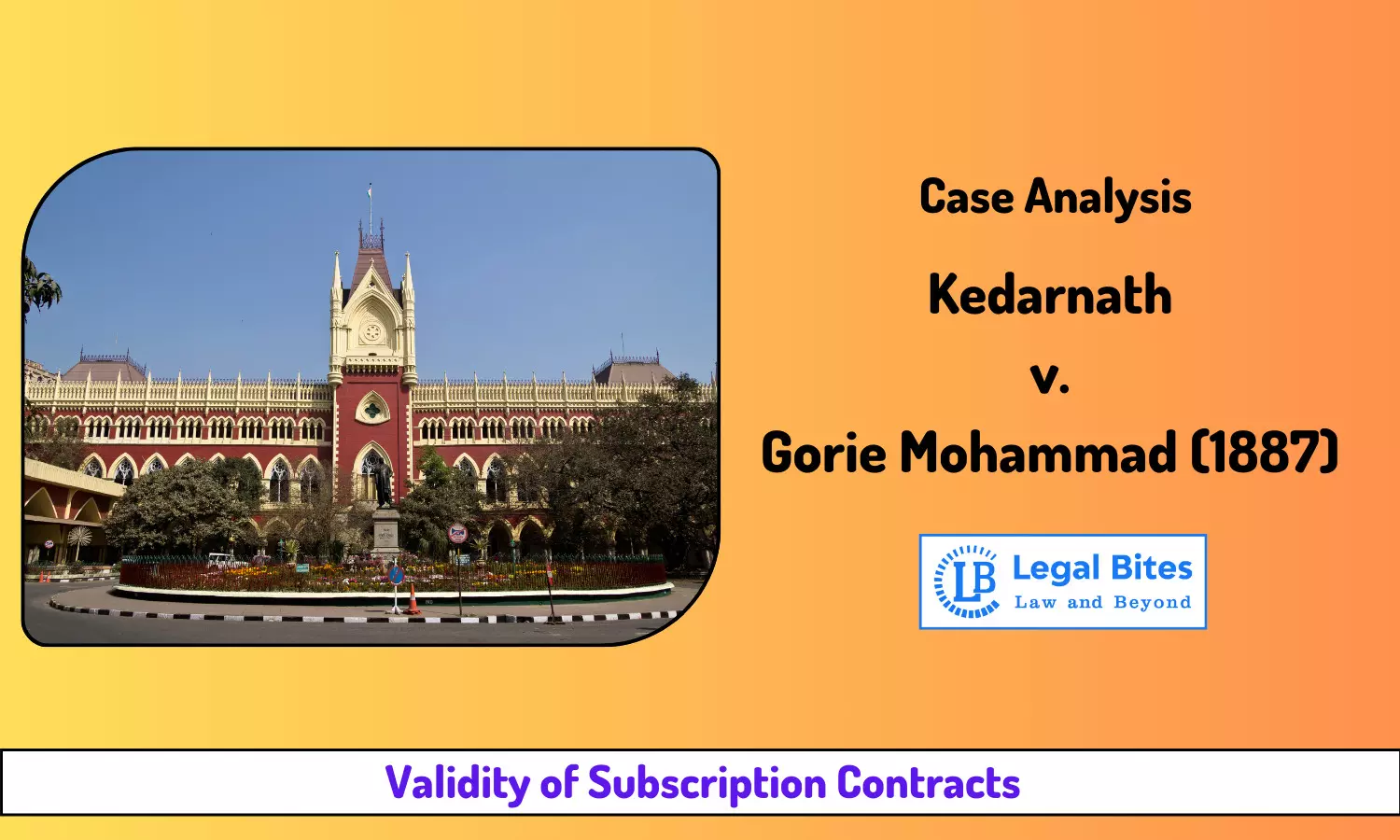Case Analysis: Kedarnath v. Gorie Mohammad (1887) | Consideration

The 'Case Analysis: Kedarnath v. Gorie Mohammad (1887)' is indeed a significant case in contract law, specifically concerning the aspect of consideration. The court's decision stated that once a promise is made, the promisor is obligated to fulfill the duty and cannot rescind it.
Case Title: Kedarnath Bhattacharji v. Gorie Mohammad
Court: Calcutta High Court
Citation: (1887) ILR 14 Cal 64
Judges: Justice William Comer Petheram and Justice Beverly
Date of Judgment: November 26, 1886
Facts of the Case
- The plaintiff, the one who filed the suit, was a Municipal Commissioner of Howrah and was also one of the trustees of the Howrah Town Hall Fund.
- It was contemplated that a Town Hall at Howrah could be constructed if sufficient subscriptions could be accumulated for the purpose.
- Therefore, the plaintiff participated in a fundraising programme wherein the programme aimed at raising funds through subscriptions for the construction of a Town Hall in Howrah, if a certain milestone was reached.
- In furtherance of such subscription, the plaintiff entered into a contract with the contractor to build the Town Hall.
- The initial budget of the contract was Rs. 26,000, however, as the subscriptions increased, the revised cost became Rs. 40,000.
- All Commissioners, including the plaintiff, were collectively responsible for the increase in cost as any modifications in the building were authorised by them.
- The defendant contributed Rs. 100 to the fundraiser by subscribing to the project.
- The plaintiff, acting on his behalf and others with similar interests, resorted to recover the subscription amount from the defendant.
- However, the defendant failed to pay the amount and contended that there was no consideration for his promise.
- The question here is regarding the plaintiff’s right to sue the defendant for the subscription amount of Rs. 100 when he is one of the persons who is personally liable for the Rs. 40,000 to the contractor.
Legal Provisions
- Section 2(d) of the Indian Contract Act, of 1872 provides for the definition of consideration for a promise.
- Section 10 lays down the essentials of a contract and lawful consideration is one of them.
- Section 25 mandates that an agreement without consideration is void (subject to certain exceptions)
Issues Raised
In essence, the case here revolves around the dual role of the plaintiff, first as a Municipal Commissioner and secondly as a trustee of the project. However, the issues are not regarding the position of the plaintiff, but mainly about the maintainability of the lawsuit filed by the plaintiff. The issues decided on by the High Court are as follows:
- Whether the suit filed by the plaintiff is legally maintainable?
- Whether the defendant is liable to pay the subscription amount?
Judgment
Prima facie, while deciding on the first issue regarding the maintainability of the suit, the court observed that keeping aside the position of the plaintiff either as a Municipal Commissioner or a trustee of the project, the plaintiff has the right to bring an action on his behalf and others who are jointly interested with him, as per the provisions of the Civil Procedure Code, 1908 (hereinafter as “CPC”). The position of the plaintiff does not matter in deciding whether he has the right to bring in a suit or not if only the provisions of the CPC are being followed, as the Code gives him the right to do so.
In this scenario, the question that was discussed by the court was whether the lawsuit filed by the plaintiff can be upheld collectively by all the Commissioners who assumed liability to the contractor, provided that they are all joined together in the legal action. The court noted that many kinds of subscriptions cannot be recovered. The court substantiated this by giving an example of an individual who puts their name for a subscription to a charity, but as there is no consideration, no amount is recoverable from them.
However, the court noted the instant case to be different from this example, as the subscription for the town hall fund was not a charitable instrument. The instant case revolves around certain individuals or persons who were asked to contribute money, i.e., subscribe, with an understanding that the money would be applied for a specific purpose known to them, particularly incurring an obligation to pay a contractor for construction work of the proposed town hall in Howrah. The court has therefore clarified the nature of the contract in this case and that is by subscribing an individual is agreeing to provide the funds for the town hall which is up to the amount they have specified in their subscription.
Putting it simply, when someone subscribes to the project they are essentially saying that they will contribute that much money for the construction work of the town hall which equals to the amount they have subscribed. The court noted that this is a perfectly valid contract which includes proper consideration and also all the essential elements which are required for a contract to be enforced. Therefore, it was the opinion of the court that in the specific matter, a valid contract exists with a lawful consideration and the said contract can be legally enforced.
The said contract which arose from the subscriptions allowed the persons incurring the liability, the Municipal Commissioners in this case, to pursue a legal action for the recovery of the subscribed amount. Hence, the court answered both the issued in affirmative, i.e., the suit filed by the plaintiff is maintainable and the defendant is liable to pay the subscribed amount of Rs. 100. Therefore, the contract can be enforced by the plaintiff as he is entitled to sue the defendant on his behalf as well as all other persons who have similar interests in the said matter. In conclusion, the court held that the Judge of the Small Cause Court should decree the suit for the claimed amount.
Conclusion
In this case, the court has discussed a form of valid consideration which is an act of abstinence done at the request of a promisor. In the instant matter, the defendant had subscribed for the project for Rs. 100 but later failed to pay the amount and contended that there was no consideration in the agreement. However, the High Court recognised the existence of a valid contract where the said subscription was held to be a lawful consideration in furtherance of the contract which was an act performed by the defendant at the promisor’s desire, giving the plaintiff the right to enforce such contract on his behalf and others who have similar interests. Therefore, the plaintiff is not only legally entitled to maintain the suit, but can also recover the amount of Rs. 100 from the defendant as a valid contract exists between them.

